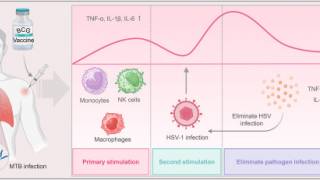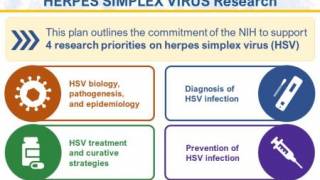Can CRISPR Create a Herpes Vaccine?

Many people learn they have Herpes Simplex Virus (HSV) when taking a blood test. Moreover, most people with genital herpes HSV-2 don’t know they have it, even if they experience mild outbreaks.
The fact is, nobody should be surprised at positive test results since a large number of people (50m) have HSV-2.
An estimated 87 percent of people with HSV-2 haven’t received a clinical diagnosis, according to the Centers for Disease Control and Prevention (CDC).
***Order your Discreet, Affordable Lab tests today***
The reason HSV-2 lasts for life is that this virus has learned to hide in our central nervous system, evading our immune system.
With genital herpes, this virus hides in the dorsal root ganglia, which is located in the spine.
Current HSV drugs do not eliminate the latent herpes virus, and therefore do not eliminate the risk of transmission or recurrent disease.
Which means, antivirals address HSV symptoms, but not the cause.
So it is understandable why so many scientists have been trying to find a vaccine for HSV-2.
There’s one new treatment that many scientists hope will be able to eliminate this life-long disease: Clustered Regularly Interspaced Short Palindromic Repeats (CRISPR), or genome editing.
Currently, most genome editing research is exploring prevention options for more complex diseases, such as cancer, heart disease, mental illness, and human immunodeficiency virus infection.
The CRISPR technology works by introducing a human-made enzyme that “snips” genes at crucial points, and can then modify them or insert different ‘spacer’ segments in their place.
CRISPR “spacer” sequences are transcribed into short RNA sequences capable of guiding the system to matching sequences of DNA. When the target DNA is found, Cas9 – one of the enzymes produced by the CRISPR system, binds to the DNA and cuts it, shutting the targeted gene off.
Which, should potentially eliminate the inherited disease.
This means CRISPR can help destroy dormant HSV viruses.
Recently, Robert Jan Lebbink, Ph.D. and his colleagues published a study regarding a CRISPR therapy that modifies the DNA, safely eliminating the HSV.
“We could efficiently remove the latent genome from infected cells, essentially curing cells of their invader,” says Dr. Lebbink.
“What’s more, the therapy seemed to have little effect on human cells hosting the virus, which is an important consideration when it comes to clearing herpes viruses from organs, such as the brain”, said Dr. Lebbink.
Until a herpes vaccine becomes commercially available, antivirals like acyclovir (Zovirax) and valacyclovir (Valtrex) have reduced mortality rates in newborns with herpes. down from 80 to 10 percent.
Both of these oral medications work by blocking the enzyme that herpes uses to copy itself and spread to other cells. This decreases viral shedding, which is the viral release that can cause lesions and infect others.
But, antivirals cannot eliminate the latent virus that keeps herpes alive in your body.
Our Trust Standards: Medical Advisory Committee
- Standard-dose and high-dose daily antiviral therapy for short episodes of genital HSV-2 reactivation
- QUESTIONS AND ANSWERS ABOUT CRISPR
- Biologic interactions between HSV-2 and HIV-1 and possible implications for HSV vaccine development
- RNA-guided endonuclease provides a therapeutic strategy to cure latent herpesviridae infection
- In vivo disruption of latent HSV by designer endonuclease therapy
- Virologic Characteristics of Subclinical and Symptomatic Genital Herpes Infections
- In Vivo Gene Knockdown in Rat Dorsal Root Ganglia Mediated by Self-Complementary Adeno-Associated Virus
- CRISPR/Cas9-Mediated Genome Editing of Herpesviruses Limits Productive and Latent Infections
- Correction of diverse muscular dystrophy mutations in human engineered heart muscle by single-site genome editing

























